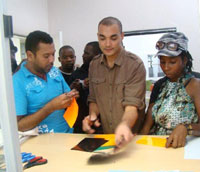
Top stories






More news


Marketing & Media
Ads are coming to AI. Does that really have to be such a bad thing?














PSS has two main sections - a research and design area, and a tool room. Full-time specialist staff are on hand for technical and design advice and to help with the use of tools and fabrication processes. Safety is paramount and the staff are all trained in first aid.
Users must make an appointment for a one-hour session, consisting of a consultation and assisted use of the tools and processes. Follow-up consultations can be made with the same advisor.
"The space is essentially an assisted DIY environment, where you can progress from idea conceptualisation to its physical manifestation with the appropriate support, infrastructure, tools and equipment," said CCDI product support manager Alan Alborough.
"Ideas can get lost because they are not nurtured and people don't know how to develop them. We are addressing this problem by offering a place where they will feel secure and empowered to do what they want to do. We meet with users individually to help them to solve problems around any process or material."
The research and design area consists of a central consultation and planning area, with computers for both research and design.
The four research computers are available for product-specific internet research. The design computers use open source software, as well as sophisticated 2D and 3D software. Some are for designing towards fabrication (such as the laser and vinyl cutters), while others have programs such as digitising embroidery software. There are also two computers with surface design software, which can be used to create patterns, logos and designs for products such as textiles or prints.
The tool room houses a wide range of conventional hand and power tools that can be used for fixing, cutting, marking, scoring, gluing, sawing and hammering together all types of materials. There are also other popular machines such as a laser cutter, a vinyl cutter and an embroidery machine. Newly installed machines include a heat press for transfers, a line bender for bending Perspex accurately and a hot wire cutter for cutting foam into all kinds of shapes.
The CCDI is a joint initiative by the Western Cape provincial government and the Cape Peninsula University of Technology. Its mission is to be a best practice institute developing people to build profitable enterprises with marketable products for global markets in an enabled environment. It is now a catalyst for sustainable enterprise development and one of the largest and most successful of government's Special Purpose Vehicles.
For consultation bookings, contact Ashanti Zwedala on +27 (0) 21 461 1488, email az.gro.idcc@troppustcudorp or go online at www.capecraftanddesign.org.za for more information.